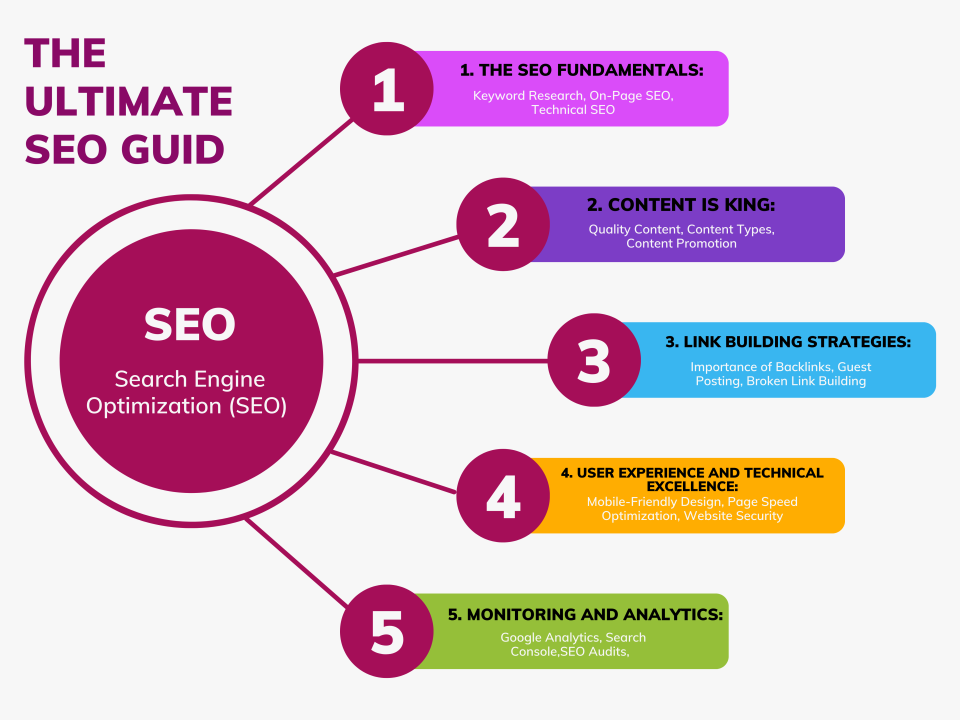Search Engine Optimization (SEO) remains a cornerstone of digital marketing, continuously evolving with search engine algorithms and user behavior. As we venture further into 2024, staying abreast of the latest SEO best practices is crucial for maintaining and improving your website’s visibility and ranking. Here’s an in-depth guide to the most effective SEO strategies that will help you navigate the dynamic landscape of search engine optimization.
1. Prioritize User Experience (UX)
User experience is at the heart of SEO. Search engines like Google increasingly prioritize websites that offer a seamless and enjoyable user experience. This encompasses various aspects, including website design, mobile responsiveness, and site speed.
UX Optimization Tips:
- Mobile-First Design: Ensure your site is fully responsive and offers a great experience on all devices.
- Page Speed: Use tools like Google PageSpeed Insights to identify and fix issues slowing down your site.
- Intuitive Navigation: Simplify your site’s structure to make it easy for users to find what they’re looking for.
2. Optimize for Core Web Vitals
Core Web Vitals are a set of metrics introduced by Google to measure user experience on web pages.
Improving Core Web Vitals:
- LCP: Optimize large images and improve server response times.
- FID: Minimize JavaScript and prioritize interactive elements.
- CLS: Avoid unexpected layout shifts by specifying dimensions for all media.
3. Embrace AI and Machine Learning
Search engines use AI to better understand user intent and deliver more relevant search results. Leveraging AI tools can enhance your SEO efforts.
AI-Driven SEO Strategies:
- Content Creation: Use AI to generate keyword-rich content and identify trending topics.
- Rank Tracking: Employ AI tools for real-time rank tracking and competitor analysis.
- SEO Audits: Utilize AI for comprehensive site audits to identify and fix issues.
4. Focus on E-A-T: Expertise, Authoritativeness, Trustworthiness
Google’s E-A-T (Expertise, Authoritativeness, Trustworthiness) principles are vital for SEO success, especially for YMYL (Your Money or Your Life) content, which includes topics that can impact health, finance, or safety.
Enhancing E-A-T:
- Quality Content: Publish well-researched and high-quality content written by experts.
- Backlinks: Earn backlinks from reputable sources to build authority.
5. Optimize for Voice Search
- Natural Language Keywords: Use long-tail keywords and natural phrases.
- Featured Snippets: Aim to provide concise and direct answers to common questions.
6. Create High-Quality, Relevant Content
Content is still king in SEO. Creating valuable, relevant, and engaging content is essential for attracting and retaining your audience.
Content Strategies:
- Topic Clusters: Organize content into clusters around a central pillar topic to improve relevance and authority.
- Regular Updates: Keep content up-to-date to ensure its accuracy and relevance.
7. Build a Strong Backlink Profile
Backlinks remain a crucial factor in SEO. High-quality backlinks from authoritative sites signal to search engines that your site is trustworthy and relevant.
Backlink Building Techniques:
- Guest Blogging: Contribute valuable content to reputable blogs in your industry.
- Broken Link Building: Find and replace broken links on other sites with your relevant content.
- Content Promotion: Share your content through various channels to attract natural backlinks.
8. Leverage Local SEO
Optimizing for local searches helps attract customers in your area and enhances your visibility in local search results.
Local SEO Tips:
- Google My Business: Ensure your listing is complete and up-to-date.
9. Utilize Structured Data and Schema Markup
Structured data and schema markup help search engines understand the content of your site better, potentially leading to enhanced search results like rich snippets.
Implementing Structured Data:
- Schema.org: Use schema markup to highlight key information such as reviews, events, and products.
- Rich Snippets: Aim to achieve rich snippets for higher visibility in search results.
- JSON-LD: Implement JSON-LD for structured data to ensure compatibility with search engines.
10. Monitor and Analyze SEO Performance
Continuous monitoring and analysis are critical to understanding the effectiveness of your SEO strategies and making necessary adjustments.
SEO Monitoring Tools:
- Google Analytics: Track website traffic and user behavior.
- Google Search Console: Monitor site performance and identify issues.
- SEO Software: Use tools like SEMrush, Ahrefs, or Moz for in-depth analysis and insights.
Conclusion
Staying ahead in the SEO game requires a blend of technical expertise, strategic planning, and continuous adaptation to the latest trends and algorithm updates. By prioritizing user experience, leveraging AI, focusing on high-quality content, and building a robust backlink profile, you can enhance your website’s visibility and drive sustainable organic traffic in 2024. Embrace these best practices, and you’ll be well-equipped to navigate the ever-changing landscape of SEO.
